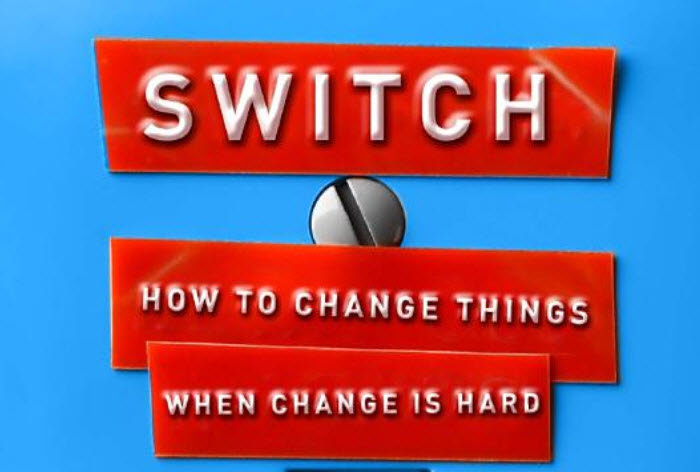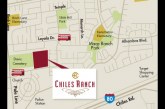 by Rob White
by Rob White
I read the book Switch by Chip and Dan Heath a few months back. The title above is from a synopsis of the book written by the Heath brothers and posted on Amazon. I thought of the book and the topic of change after a series of conversations over the last few days with representatives of the media, the university and entrepreneurs. Conversations that often centered on a changing tide of positive dialogue drowning out negativity.
To find a quick synopsis of the book Switch to share with you, I turned to Amazon. On Amazon, Publishers Weekly describes the book this way, “The Heath brothers (coauthors of Made to Stick) address motivating employees, family members, and ourselves in their analysis of why we too often fear change. Change is not inherently frightening, but our ability to alter our habits can be complicated by the disjunction between our rational and irrational minds: the self that wants to be swimsuit-season ready and the self that acquiesces to another slice of cake anyway.”
The Publishers Weekly synopsis continues, “The trick is to find the balance between our powerful drives and our reason. The authors’ lessons are backed up by anecdotes that deal with such things as new methods used to reform abusive parents, the revitalization of a dying South Dakota town, and the rebranding of megastore Target. Through these lively examples, the Heaths speak energetically and encouragingly on how to modify our behaviors and businesses. This clever discussion is an entertaining and educational must-read for executives and for ordinary citizens looking to get out of a rut.”
Because no one will probably do a better synopsis of the book than the authors themselves, let me post the synopsis from Amazon down by the Heath brothers. They begin, ” ‘Change is hard.’ ‘People hate change.’ Those were two of the most common quotes we heard when we began to study change.”
They continue, “But it occurred to us that if people hate change, they have a funny way of showing it. Every iPhone sold serves as counter-evidence. So does every text message sent, every corporate merger finalized, every aluminum can recycled. And we haven’t even mentioned the biggest changes: Getting married. Having kids. (If people hate change, then having a kid is an awfully dumb decision.)”
“It puzzled us–why do some huge changes, like marriage, come joyously, while some trivial changes, like submitting an expense report on time, meet fierce resistance?”
“We found the answer in the research of some brilliant psychologists who’d discovered that people have two separate “systems” in their brains-a rational system and an emotional system. The rational system is a thoughtful, logical planner. The emotional system is, well, emotional-and impulsive and instinctual.”
“When these two systems are in alignment, change can come quickly and easily (as when a dreamy-eyed couple gets married). When they’re not, change can be grueling (as anyone who has struggled with a diet can attest).”
“In those situations where change is hard, is it possible to align the two systems? Is it possible to overcome our internal “schizophrenia” about change? We believe it is.”
They conclude, “In our research, we studied people trying to make difficult changes: People fighting to lose weight and keep it off. Managers trying to overhaul an entrenched bureaucracy. Activists combatting seemingly intractable problems such as child malnutrition. They succeeded–and, to our surprise, we found striking similarities in the strategies they used. They seemed to share a similar game plan. We wanted, in Switch, to make that game plan available to everyone, in hopes that we could show people how to make the hard changes in life a little bit easier.”
The Publishers Weekly synopsis uses the idea of getting “out of a rut” when describing the book. It is my strong belief that it is time to “get out of a rut” in the way we have conversations in Davis. My dialogue with those community leaders I referenced earlier and the discussions I have had over the last 6 months with many in Davis have seemed to bring up at one time or another a desire to change the tenor and quality of our conversations. But if so many of us are talking about this need to create a positive community dialogue, why is it so hard to change?
I suppose it’s because we have a few people that are resistant to that change. In changing the quality and tenor of the dialogue, we should point out that there are always going to be some that are motivated by fear, greed or selfishness. And I have thought a lot about that for the last few months. I am reminded by the Heath brothers that we have “two separate ‘systems’ in their brains-a rational system and an emotional system. The rational system is a thoughtful, logical planner. The emotional system is emotional-and impulsive and instinctual.”
When put it in this context, it starts to make sense. We are all human and sometimes we act from our emotional system without much thought to how it will impact others. We can be uncomfortable when out of balance and sometimes can’t figure out how to get back to a rational self. Those of us surrounding those ’emotionally driven’ people can work to help them come back to the rational system to create a thoughtful set of actions. This can partly be done by giving people a forum where they can feel heard and valued is important.
It will be important to make this change because we are discussing some proposals that are of great significance to Davis and the region and we need to understand what those proposals might mean if enacted in whole or part. In order to progress the dialogue, I think we need to also strive to understand our own motivations and the motivations of others in this dialogue. Look through someone else’s pair of glasses, so to speak.
Will this take care of all of the “emotionally” driven actions by some in our community? Doubtful, but it can certainly go a long way to change the overall tenor of the dialogue. And those that want to keep working from a place of fear, greed, hurt, or other negative emotion will find themselves farther and farther outside the dialogue and less and less relevant.
We have important work to do and we all share a community that deserves our best selves working on those important items. Adding your own positive, ‘rational’ voice to that dialogue will make Davis even better and will result in decision making and actions that move our community forward.





As a woman, I like emotional people. We still feel.
how can we collectively overcome the resistance to change in this community?
[quote]how can we collectively overcome the resistance to change in this community? [/quote]
I guess that depends on what that “change” is? Should we just overcome the resistance to the change you like?
it is an eye of beholder sort of argument
DP & GI- i’m suggesting a change in the tenor of our community dialogue and how we work together. If you get a chance to read the book, I highly suggest it. Fast read, lots of examples, heavily based in research.